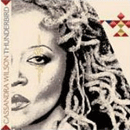 This
is different. Not only is this a group of songs not bound
by genre, as a composite it can't be labeled as any given
type of music. It is simply contemporary music at the most
adventurous and innovative level. Music that reveals new
subtleties and nuances with every listen. Within
the eclectic collection of songs on Thunderbird,
fragments of jazz, rock, pop, blues, folk, and hip-hop driven
loops and samples overlap and intertwine. There are multiple
shifts in mood and texture in almost every song. Sometimes
purposefully fragmented and dissonant, it never falters or
stalls because in front of it all is one of the most expressive
and exceptional voices in contemporary music. Only a truly
gifted interpreter could pull this off and Cassandra Wilson
is an extremely gifted interpreter. She can take any
song she chooses to sing and immerse you in it. In her hands
even a simple campfire song like "Red River Valley" leaves
you hanging on to every word. This
is different. Not only is this a group of songs not bound
by genre, as a composite it can't be labeled as any given
type of music. It is simply contemporary music at the most
adventurous and innovative level. Music that reveals new
subtleties and nuances with every listen. Within
the eclectic collection of songs on Thunderbird,
fragments of jazz, rock, pop, blues, folk, and hip-hop driven
loops and samples overlap and intertwine. There are multiple
shifts in mood and texture in almost every song. Sometimes
purposefully fragmented and dissonant, it never falters or
stalls because in front of it all is one of the most expressive
and exceptional voices in contemporary music. Only a truly
gifted interpreter could pull this off and Cassandra Wilson
is an extremely gifted interpreter. She can take any
song she chooses to sing and immerse you in it. In her hands
even a simple campfire song like "Red River Valley" leaves
you hanging on to every word.
Thunderbird unites
Wilson with T-Bone Burnett, whose ability to popularize off
the beaten path musicians by finding settings that enhance
their quirkiness rather than burying it, culminated with
the success of the roots music/bluegrass driven Brother
Where Art Thou soundtrack. The rest of the
musicians have equally wide-ranging credentials. Keefus Ciancaia
(keyboards) has played with Fishbone, Macy Gray, Dr. Dre
and Alison Krauss. Mike Elizondo (electric bass) worked with
Eminem and Fiona Apple. Guitarist Colin Linden played on
the "O Brother..." soundtrack.
Reginald Veal (bass) and Gregoire Maret (harmonica) are from
Wilson's touring band. Legendary drummer Jim Keltner (various
Stones and Beatles Joni Mitchell, Steely Dan and the list
goes on), influential avant-garde guitarist Marc Ribot, and
Keb'Mo' also contributed. They have created an album
that is a departure from the intimate acoustic sound of her
recent work but has some common threads.
"Go To Mexico" starts with a jangly keyboard/drum
over a sample taken from the Wild Tchoupitoulas “Hey
Pocky A-Way” and a beat that will get you moving. Then
there is the voice, but she's singing higher and lighter
than usual until several other layers of vocals wrap around
the melody line and Keltner's drums kick in. The first taste
of one of the most intriguing things about the production
- the seamless juxtaposition of programmed and live, high
tech and organic. There is a haunting restlessness in the
love songs. She has discovered a gem in Jakob Dylan's achingly
beautiful "Closer to You." "It Would Be So
Easy" hangs a tangible sense of longing on rock hook
and a dark, funky backbeat then brings it home with an infectious
chorus. "Poet" spins in a pool of electronica
and jazz/rock guitar chords. "Lost" with just
Wilson's voice and Ribot's guitar, sounds like a jazz standard
but it's actually a song Burnett wrote for the 2005 film "Don't
Come Knocking." "Tarot" has the ambience of
some of the highlights of Joni Mitchell's jazz phase, similar
in phrasing, theme, and instrumentation but it's more fleshed
out.
Every song has its highlights but even among
those several songs still stand out. "Red River Valley" is
one of the most unlikely performances I've ever heard. She
completely reconceptualizes it, stretching it out into a
bluesy narrative accompanied only by Linden's slide guitar. "Easy
Rider," the
Blind Lemon Jefferson blues classic, is a seven minute showcase
reminiscent of those long bluesy jams from classic Cream
and Hendrix albums. It veers from electric to acoustic, subtle
to powerful, and loud to soft while this magnificent voice
just pulls every ounce of blues out of every word.
There is the link. It's a different era
and, in a sense, a different type of music but playing this
one straight through feels like listening to the radio late
at night when "progressive" stations
were just starting up and people were picking the songs that
moved them and playing them in sets guided by stream of consciousness
and quality of song. Hearing it made you feel like you were
a part of something fresh, new, and very important. Thunderbird has
that spirit. By not being referential to any era but the one
we are living in now it shows that the spirit still exists
and there are still places that only music like this can take
you.
- Shannon West |

